Deck 18: Transportation and Assignment Solution Methods
Question
Question
Question
Question
Question
Question
Question
Question
Question
Question
Question
Question
Question
Question
Question
Question
Question
Question
Question
Question
Question
Question
Question
Question
Question
Question
Question
Question
Question
Question
Question
Question
Question
Question
Question
Question
Question
Question
Question
Question
Question
Question
Question
Question
Question
Question
Question
Question
Question
Question
Question
Question
Question
Question
Question
Question
Question
Question
Question
Question
Question
Question
Question
Question
Question
Question
Question
Question
Question
Question
Question
Question
Question
Question
Question
Question
Question
Question
Question
Question

Unlock Deck
Sign up to unlock the cards in this deck!
Unlock Deck
Unlock Deck
1/86
Play
Full screen (f)
Deck 18: Transportation and Assignment Solution Methods
1
In a balanced transportation model where supply equals demand, all constraints are equalities.
True
2
Assignments are made to locations with 0 in the opportunity cost table.
True
3
If the number of unique assignments is less than the number of rows or columns, a line test must be used.
True
4
The transportation model is a special type of linear regression model.

Unlock Deck
Unlock for access to all 86 flashcards in this deck.
Unlock Deck
k this deck
5
It is not possible to solve a transportation problem that has ≤ instead of = signs for the supply constraints.

Unlock Deck
Unlock for access to all 86 flashcards in this deck.
Unlock Deck
k this deck
6
An assignment problem that involves 6 machines to be assigned to 4 workers cannot be solved using the assignment problem solution procedure described.

Unlock Deck
Unlock for access to all 86 flashcards in this deck.
Unlock Deck
k this deck
7
The supply and demand values along the outside rim of a tableau are called rim requirements.

Unlock Deck
Unlock for access to all 86 flashcards in this deck.
Unlock Deck
k this deck
8
Unacceptable (prohibited) routes in a transportation problem are assigned cost values of zero.

Unlock Deck
Unlock for access to all 86 flashcards in this deck.
Unlock Deck
k this deck
9
The linear programming model for a transportation problem has constraints for supply at each source and demand at each destination.

Unlock Deck
Unlock for access to all 86 flashcards in this deck.
Unlock Deck
k this deck
10
An assignment problem is a special form of transportation problem where all supply and demand values equal 0.

Unlock Deck
Unlock for access to all 86 flashcards in this deck.
Unlock Deck
k this deck
11
In a transportation problem, items are allocated from sources to destinations at a minimum cost.

Unlock Deck
Unlock for access to all 86 flashcards in this deck.
Unlock Deck
k this deck
12
An opportunity cost table is developed by first subtracting the minimum value in each row from all other row values and then repeating this process for each column.

Unlock Deck
Unlock for access to all 86 flashcards in this deck.
Unlock Deck
k this deck
13
An opportunity cost table is developed by first subtracting the minimum value in each row from all other row values and then repeating this process for each row.

Unlock Deck
Unlock for access to all 86 flashcards in this deck.
Unlock Deck
k this deck
14
The transportation model assumes that shipping costs are the same, regardless of the number of units shipped.

Unlock Deck
Unlock for access to all 86 flashcards in this deck.
Unlock Deck
k this deck
15
An optimal solution occurs when the number of independent unique assignments equals the number of rows or columns.

Unlock Deck
Unlock for access to all 86 flashcards in this deck.
Unlock Deck
k this deck
16
An assignment problem is a special form of transportation problem where all supply and demand values equal 1.

Unlock Deck
Unlock for access to all 86 flashcards in this deck.
Unlock Deck
k this deck
17
Assignments are made to locations with 1 in the opportunity cost table.

Unlock Deck
Unlock for access to all 86 flashcards in this deck.
Unlock Deck
k this deck
18
In a balanced transportation model where supply equals demand, all constraints are inequalities.

Unlock Deck
Unlock for access to all 86 flashcards in this deck.
Unlock Deck
k this deck
19
Transportation problems can be solved by the simplex method.

Unlock Deck
Unlock for access to all 86 flashcards in this deck.
Unlock Deck
k this deck
20
Transportation problems are solved manually within a tableau format.

Unlock Deck
Unlock for access to all 86 flashcards in this deck.
Unlock Deck
k this deck
21
Generally, ________ problems match people to an equal number of tasks at a minimum cost.

Unlock Deck
Unlock for access to all 86 flashcards in this deck.
Unlock Deck
k this deck
22
A(n) ________ solution occurs when the number of independent unique assignments equals the number of rows or columns.

Unlock Deck
Unlock for access to all 86 flashcards in this deck.
Unlock Deck
k this deck
23
Given the following transportation tableau where the numbers in each cell represent transportation costs from the specific source to the specific destination with supply figures corresponding to each source and demand figures corresponding to each destination:

According to the Northwest Corner method, the initial solution would have a total transportation cost of ________.

According to the Northwest Corner method, the initial solution would have a total transportation cost of ________.

Unlock Deck
Unlock for access to all 86 flashcards in this deck.
Unlock Deck
k this deck
24
Given the following transportation tableau where the numbers in each cell represent transportation costs from the specific source to the specific destination with supply figures corresponding to each source and demand figures corresponding to each destination:

According to the Northwest Corner method, the initial solution would give to cell B2 a loading of ________.

According to the Northwest Corner method, the initial solution would give to cell B2 a loading of ________.

Unlock Deck
Unlock for access to all 86 flashcards in this deck.
Unlock Deck
k this deck
25
________ model is a method for determining an initial solution for a transportation problem based on the concept of penalty cost or regret.

Unlock Deck
Unlock for access to all 86 flashcards in this deck.
Unlock Deck
k this deck
26
In a transportation tableau with m rows and n columns, if there are fewer than n+m-1 allocations, the tableau is said to be ________.

Unlock Deck
Unlock for access to all 86 flashcards in this deck.
Unlock Deck
k this deck
27
In using the Vogel's Approximation model, a ________ is the difference between the largest and next largest cell cost in a row.

Unlock Deck
Unlock for access to all 86 flashcards in this deck.
Unlock Deck
k this deck
28
When the number of people and the number of tasks are not equal in an assignment problem then the problem cannot be solved.

Unlock Deck
Unlock for access to all 86 flashcards in this deck.
Unlock Deck
k this deck
29
Vogel's approximation method allocates to the minimum cost cell in the row or column with the ________ penalty cost.

Unlock Deck
Unlock for access to all 86 flashcards in this deck.
Unlock Deck
k this deck
30
When supply exceeds demand, a dummy ________ is added to the solution tableau.

Unlock Deck
Unlock for access to all 86 flashcards in this deck.
Unlock Deck
k this deck
31
In a transportation tableau to rectify a degenerate tableau, an empty cell must artificially be treated as an ________ cell.

Unlock Deck
Unlock for access to all 86 flashcards in this deck.
Unlock Deck
k this deck
32
In the ________ method, the largest possible allocation is made to the cell in the upper-left-hand corner of the tableau, followed by allocations to adjacent feasible cells.

Unlock Deck
Unlock for access to all 86 flashcards in this deck.
Unlock Deck
k this deck
33
A(n) ________ problem is a special form of transportation problem where all supply and demand values equal 1.

Unlock Deck
Unlock for access to all 86 flashcards in this deck.
Unlock Deck
k this deck
34
The three methods for identifying initial feasible solutions to transportation problems are ________, ________, and ________.

Unlock Deck
Unlock for access to all 86 flashcards in this deck.
Unlock Deck
k this deck
35
If the number of unique assignments is less than the number of rows, then a ________ test must be used.

Unlock Deck
Unlock for access to all 86 flashcards in this deck.
Unlock Deck
k this deck
36
When demand exceeds supply, a dummy ________ is added to the solution tableau.

Unlock Deck
Unlock for access to all 86 flashcards in this deck.
Unlock Deck
k this deck
37
A multiple optimal solution occurs when an empty cell has a cost change of ________ and all other empty cells are positive.

Unlock Deck
Unlock for access to all 86 flashcards in this deck.
Unlock Deck
k this deck
38
A(n) ________ table is developed by first subtracting the minimum value in each row from all other row values and then repeating the process for each column.

Unlock Deck
Unlock for access to all 86 flashcards in this deck.
Unlock Deck
k this deck
39
The two solution methods for transportation problems that do not require the use of a computer are ________ and ________.

Unlock Deck
Unlock for access to all 86 flashcards in this deck.
Unlock Deck
k this deck
40
In using the minimum cell cost method, as much as possible is allocated to the cell with the ________ cost.

Unlock Deck
Unlock for access to all 86 flashcards in this deck.
Unlock Deck
k this deck
41
Given the following transportation tableau where the numbers in each cell represent transportation costs from the specific source to the specific destination with supply figures corresponding to each source and demand figures corresponding to each destination:

According to the minimum cell cost method, the initial solution would have a total transportation cost of ________.

According to the minimum cell cost method, the initial solution would have a total transportation cost of ________.

Unlock Deck
Unlock for access to all 86 flashcards in this deck.
Unlock Deck
k this deck
42
Canning Transport wants to move goods from three (3) factories to three (3) distribution centers. Information about the move is given below:

 Shipping costs are (in $):
Shipping costs are (in $):

According to the Northwest Corner method, the initial solution would give to cell CIII a loading of ________.

 Shipping costs are (in $):
Shipping costs are (in $):
According to the Northwest Corner method, the initial solution would give to cell CIII a loading of ________.

Unlock Deck
Unlock for access to all 86 flashcards in this deck.
Unlock Deck
k this deck
43
There are 4 jobs in a 4 person office that must be done as quickly as possible. The supervisor has used the assignment method to assign people to jobs, and has completed the first step. She had to rush off to a meeting and has asked to assign the jobs to the people before she returns. The original matrix which shows the expected completion time for each person for each job, and the one she just completed are both shown below.


Which person should be assigned to which job? How long will the jobs take?


Which person should be assigned to which job? How long will the jobs take?

Unlock Deck
Unlock for access to all 86 flashcards in this deck.
Unlock Deck
k this deck
44
Given the following transportation tableau where the numbers in each cell represent transportation costs from the specific source to the specific destination with supply figures corresponding to each source and demand figures corresponding to each destination:

According to the Vogel's Approximation Method, the initial solution would have a total transportation cost of ________.

According to the Vogel's Approximation Method, the initial solution would have a total transportation cost of ________.

Unlock Deck
Unlock for access to all 86 flashcards in this deck.
Unlock Deck
k this deck
45
Canning Transport wants to move goods from three (3) factories to three (3) distribution centers. Information about the move is given below:

 Shipping costs are (in $):
Shipping costs are (in $):

According to the Vogel's Approximation Method, the initial solution would have a total transportation cost of ________.

 Shipping costs are (in $):
Shipping costs are (in $):
According to the Vogel's Approximation Method, the initial solution would have a total transportation cost of ________.

Unlock Deck
Unlock for access to all 86 flashcards in this deck.
Unlock Deck
k this deck
46
A large book publisher has five manuscripts that must be edited as soon as possible. Five editors are available for doing the work; however, their working times on the various manuscripts will differ based on their backgrounds and interests. The publisher wants to use an assignment method to determine who does which manuscript. Estimates of editing times (in hours) for each manuscript by each editor are: 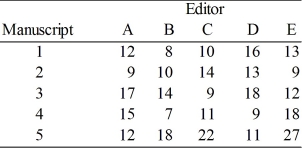
How many variables are involved in this assignment method?

How many variables are involved in this assignment method?

Unlock Deck
Unlock for access to all 86 flashcards in this deck.
Unlock Deck
k this deck
47
Given the following transportation tableau where the numbers in each cell represent transportation costs from the specific source to the specific destination with supply figures corresponding to each source and demand figures corresponding to each destination:

According to the Vogel's Approximation Method, the initial solution would give to cell B2 a loading of ________.

According to the Vogel's Approximation Method, the initial solution would give to cell B2 a loading of ________.

Unlock Deck
Unlock for access to all 86 flashcards in this deck.
Unlock Deck
k this deck
48
What is the objective function?

Unlock Deck
Unlock for access to all 86 flashcards in this deck.
Unlock Deck
k this deck
49
Canning Transport wants to move goods from three (3) factories to three (3) distribution centers. Information about the move is given below:

 Shipping costs are (in $):
Shipping costs are (in $):

According to the Vogel's Approximation Method, the initial solution would give to cell CII a loading of ________.

 Shipping costs are (in $):
Shipping costs are (in $):
According to the Vogel's Approximation Method, the initial solution would give to cell CII a loading of ________.

Unlock Deck
Unlock for access to all 86 flashcards in this deck.
Unlock Deck
k this deck
50
What are the supply-side constraints?

Unlock Deck
Unlock for access to all 86 flashcards in this deck.
Unlock Deck
k this deck
51
Given the following transportation tableau where the numbers in each cell represent transportation costs from the specific source to the specific destination with supply figures corresponding to each source and demand figures corresponding to each destination:

According to the minimum cell cost method, the initial solution would give to cell C1 a loading of ________.

According to the minimum cell cost method, the initial solution would give to cell C1 a loading of ________.

Unlock Deck
Unlock for access to all 86 flashcards in this deck.
Unlock Deck
k this deck
52
What are the demand-side constraints?

Unlock Deck
Unlock for access to all 86 flashcards in this deck.
Unlock Deck
k this deck
53
Canning Transport wants to move goods from three (3) factories to three (3) distribution centers. Information about the move is given below:

 Shipping costs are (in $):
Shipping costs are (in $):

According to the minimum cell cost method, the initial solution would give to cell BI a loading of ________.

 Shipping costs are (in $):
Shipping costs are (in $):
According to the minimum cell cost method, the initial solution would give to cell BI a loading of ________.

Unlock Deck
Unlock for access to all 86 flashcards in this deck.
Unlock Deck
k this deck
54
Canning Transport wants to move goods from three (3) factories to three (3) distribution centers. Information about the move is given below:

 Shipping costs are (in $):
Shipping costs are (in $):

According to the Northwest Corner method, the initial solution would have a total transportation cost of ________.

 Shipping costs are (in $):
Shipping costs are (in $):
According to the Northwest Corner method, the initial solution would have a total transportation cost of ________.

Unlock Deck
Unlock for access to all 86 flashcards in this deck.
Unlock Deck
k this deck
55
Canning Transport wants to move goods from three (3) factories to three (3) distribution centers. Information about the move is given below:

 Shipping costs are (in $):
Shipping costs are (in $):

According to the minimum cell cost method, the initial solution would have a total transportation cost of ________.

 Shipping costs are (in $):
Shipping costs are (in $):
According to the minimum cell cost method, the initial solution would have a total transportation cost of ________.

Unlock Deck
Unlock for access to all 86 flashcards in this deck.
Unlock Deck
k this deck
56
Consider the following transportation tableau with the initial solution provided. Use the stepping stone method to identify a better allocation. 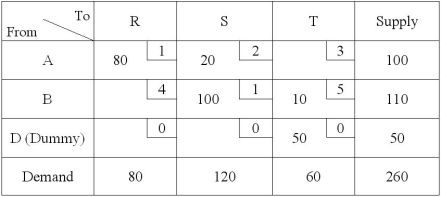


Unlock Deck
Unlock for access to all 86 flashcards in this deck.
Unlock Deck
k this deck
57
The student internship director needs as much coverage as possible in the office next week. The more hours that can be put in each day, the better. She has asked the students to provide a list of how many hours they are available each day of the week. Each student can be there on only one day and there must be a student in the office each day of the week. Use the table below and the tables provided to determine the schedule that gives the most coverage. Note that the objective of this problem is to maximize the hours worked, not minimize.



Unlock Deck
Unlock for access to all 86 flashcards in this deck.
Unlock Deck
k this deck
58
In a transportation problem, items are allocated from sources to destinations at a
A) maximum cost.
B) minimum cost.
C) minimum profit.
D) minimum revenue.
A) maximum cost.
B) minimum cost.
C) minimum profit.
D) minimum revenue.

Unlock Deck
Unlock for access to all 86 flashcards in this deck.
Unlock Deck
k this deck
59
An independent operator is planning shipments of gasoline from two sources to three destinations. Per ton transportation costs are given in the following table. 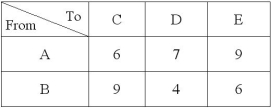
There are 1000 tons available at A and 1300 tons available at B. Since the destinations want as much as possible, the owner has decided to ship out all available quantities. Solve using either stepping stone or MODI.

There are 1000 tons available at A and 1300 tons available at B. Since the destinations want as much as possible, the owner has decided to ship out all available quantities. Solve using either stepping stone or MODI.

Unlock Deck
Unlock for access to all 86 flashcards in this deck.
Unlock Deck
k this deck
60
A large book publisher has five manuscripts that must be edited as soon as possible. Five editors are available for doing the work; however, their working times on the various manuscripts will differ based on their backgrounds and interests. The publisher wants to use an assignment method to determine who does which manuscript. Estimates of editing times (in hours) for each manuscript by each editor are: 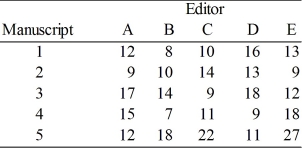
How many constraints are needed?

How many constraints are needed?

Unlock Deck
Unlock for access to all 86 flashcards in this deck.
Unlock Deck
k this deck
61
An assignment problem is a special form of transportation problem where all supply and demand values equal:
A) -1 or 1
B) -1
C) 0
D) 1
A) -1 or 1
B) -1
C) 0
D) 1

Unlock Deck
Unlock for access to all 86 flashcards in this deck.
Unlock Deck
k this deck
62
Use the following table and the information to answer the questions below.
In the following transportation matrix, all cells except 2C have been evaluated and show no improvement. Evaluate that cell.

What is the reduced cost if we decide to allocate to cell 2C?
A) -2
B) -1
C) 0
D) +1
E) +2
In the following transportation matrix, all cells except 2C have been evaluated and show no improvement. Evaluate that cell.

What is the reduced cost if we decide to allocate to cell 2C?
A) -2
B) -1
C) 0
D) +1
E) +2

Unlock Deck
Unlock for access to all 86 flashcards in this deck.
Unlock Deck
k this deck
63
Which of the following are assumptions or requirements of the transportation problem?
A) Minimum quantities must be shipped.
B) Shipping costs per unit do not vary with the quantity shipped.
C) There can only be one source.
D) all of the above
A) Minimum quantities must be shipped.
B) Shipping costs per unit do not vary with the quantity shipped.
C) There can only be one source.
D) all of the above

Unlock Deck
Unlock for access to all 86 flashcards in this deck.
Unlock Deck
k this deck
64
The transportation method is a linear programming technique where linearity can be found in which of the following ways?
A) The cost of goods shipped from any source to any destination is a linear function of quantity shipped.
B) The total cost associated with a given plan is a linear function of shipping costs.
C) Cell evaluations assume linear movements through the matrix.
D) The cost of goods shipped from any source to any destination is a linear function of the cost per unit.
A) The cost of goods shipped from any source to any destination is a linear function of quantity shipped.
B) The total cost associated with a given plan is a linear function of shipping costs.
C) Cell evaluations assume linear movements through the matrix.
D) The cost of goods shipped from any source to any destination is a linear function of the cost per unit.

Unlock Deck
Unlock for access to all 86 flashcards in this deck.
Unlock Deck
k this deck
65
Use the following table and the information to answer the questions below.
In the following transportation matrix, all cells except 2C have been evaluated and show no improvement. Evaluate that cell.

Make the necessary allocation to cell 2C and determine the total transportation cost.
A) 936
B) 928
C) 908
D) 852
E) 878
In the following transportation matrix, all cells except 2C have been evaluated and show no improvement. Evaluate that cell.

Make the necessary allocation to cell 2C and determine the total transportation cost.
A) 936
B) 928
C) 908
D) 852
E) 878

Unlock Deck
Unlock for access to all 86 flashcards in this deck.
Unlock Deck
k this deck
66
In the linear programming formulation of a transportation network,
A) there is one variable for each arc.
B) there is one constraint for each node.
C) the sum of variables corresponding to arcs out of an origin node is constrained by the supply at that node.
D) all of the above
A) there is one variable for each arc.
B) there is one constraint for each node.
C) the sum of variables corresponding to arcs out of an origin node is constrained by the supply at that node.
D) all of the above

Unlock Deck
Unlock for access to all 86 flashcards in this deck.
Unlock Deck
k this deck
67
Consider the following transportation tableau which shows the initial solution. Evaluate the cost of allocating units to cell CR. 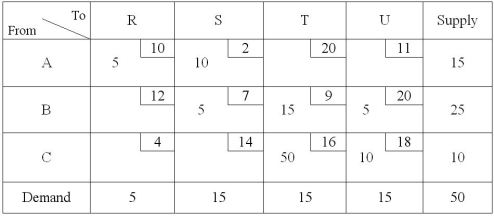
A) -12
B) -9
C) -6
D) -2
E) +3

A) -12
B) -9
C) -6
D) -2
E) +3

Unlock Deck
Unlock for access to all 86 flashcards in this deck.
Unlock Deck
k this deck
68
The transportation method assumes that
A) the number of rows is equal to the number of columns.
B) there must be at least 2 rows and at least 2 columns.
C) both A and B
D) the product of rows minus 1 and columns minus 1 should not be less than the number of completed cells.
A) the number of rows is equal to the number of columns.
B) there must be at least 2 rows and at least 2 columns.
C) both A and B
D) the product of rows minus 1 and columns minus 1 should not be less than the number of completed cells.

Unlock Deck
Unlock for access to all 86 flashcards in this deck.
Unlock Deck
k this deck
69
Assignments are made to locations with ________ in the opportunity cost table.
A) -1 or 1
B) -1
C) 1
D) 0
A) -1 or 1
B) -1
C) 1
D) 0

Unlock Deck
Unlock for access to all 86 flashcards in this deck.
Unlock Deck
k this deck
70
In a transportation problem, items are allocated from sources to destinations at a ________ cost.
A) maximum
B) minimum
C) high
D) low
A) maximum
B) minimum
C) high
D) low

Unlock Deck
Unlock for access to all 86 flashcards in this deck.
Unlock Deck
k this deck
71
Use the following table and the information to answer the questions below.
In the following transportation matrix, all cells except 2C have been evaluated and show no improvement. Evaluate that cell.

How many units would be allocated to cell 2C?
A) 10
B) 14
C) 6
D) 0
E) 20
In the following transportation matrix, all cells except 2C have been evaluated and show no improvement. Evaluate that cell.

How many units would be allocated to cell 2C?
A) 10
B) 14
C) 6
D) 0
E) 20

Unlock Deck
Unlock for access to all 86 flashcards in this deck.
Unlock Deck
k this deck
72
The linear programming model for a transportation problem has constraints for
A) supply at each source.
B) supply at each source and demand at each destination.
C) demand at each destination.
D) a feasible solution.
A) supply at each source.
B) supply at each source and demand at each destination.
C) demand at each destination.
D) a feasible solution.

Unlock Deck
Unlock for access to all 86 flashcards in this deck.
Unlock Deck
k this deck
73
The supply and demand values along the outside rim of a tableau are called
A) rim requirements.
B) rim columns.
C) rim rows.
D) all of the above
A) rim requirements.
B) rim columns.
C) rim rows.
D) all of the above

Unlock Deck
Unlock for access to all 86 flashcards in this deck.
Unlock Deck
k this deck
74
Which of the following assumptions is not an assumption of the transportation model?
A) Shipping costs are constant.
B) There is only one transportation route between source and destination.
C) There is only one transportation mode between source and destination.
D) Actual supply and actual demand must be equal.
A) Shipping costs are constant.
B) There is only one transportation route between source and destination.
C) There is only one transportation mode between source and destination.
D) Actual supply and actual demand must be equal.

Unlock Deck
Unlock for access to all 86 flashcards in this deck.
Unlock Deck
k this deck
75
In a balanced transportation model where supply equals demand, all constraints are
A) inequalities.
B) equalities.
C) A and B
D) none of the above
A) inequalities.
B) equalities.
C) A and B
D) none of the above

Unlock Deck
Unlock for access to all 86 flashcards in this deck.
Unlock Deck
k this deck
76
Which of the following assumptions is not an assumption of the transportation model?
A) Shipping costs per unit are constant.
B) There is one transportation route between each source and destination.
C) There is one transportation mode between each source and destination.
D) Actual total supply and actual total demand must be equal.
A) Shipping costs per unit are constant.
B) There is one transportation route between each source and destination.
C) There is one transportation mode between each source and destination.
D) Actual total supply and actual total demand must be equal.

Unlock Deck
Unlock for access to all 86 flashcards in this deck.
Unlock Deck
k this deck
77
Consider the following transportation tableau which shows the initial solution. Evaluate the cost of allocating units to cell DR. 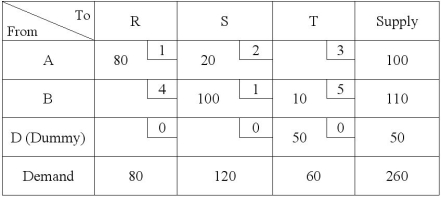
A) -5
B) -2
C) 0
D) 3
E) 5

A) -5
B) -2
C) 0
D) 3
E) 5

Unlock Deck
Unlock for access to all 86 flashcards in this deck.
Unlock Deck
k this deck
78
The problem that deals with the distribution of goods from several sources to several destinations is the
A) network problem.
B) assignment problem.
C) transportation problem.
D) transshipment problem.
A) network problem.
B) assignment problem.
C) transportation problem.
D) transshipment problem.

Unlock Deck
Unlock for access to all 86 flashcards in this deck.
Unlock Deck
k this deck
79
Which of the following are assumptions or requirements of transportation problems?
I) Goods are the same from each source.
II) There must be a single source.
III) Minimum quantities must be shipped.
IV) Shipping costs per unit do not vary with the quantity shipped.
A) I and III
B) I, II, and IV
C) I and IV
D) II and III
I) Goods are the same from each source.
II) There must be a single source.
III) Minimum quantities must be shipped.
IV) Shipping costs per unit do not vary with the quantity shipped.
A) I and III
B) I, II, and IV
C) I and IV
D) II and III

Unlock Deck
Unlock for access to all 86 flashcards in this deck.
Unlock Deck
k this deck
80
The ________ problem deals with the distribution of goods from several sources to several destinations.
A) network
B) assignment
C) transportation
D) transshipment
A) network
B) assignment
C) transportation
D) transshipment

Unlock Deck
Unlock for access to all 86 flashcards in this deck.
Unlock Deck
k this deck


